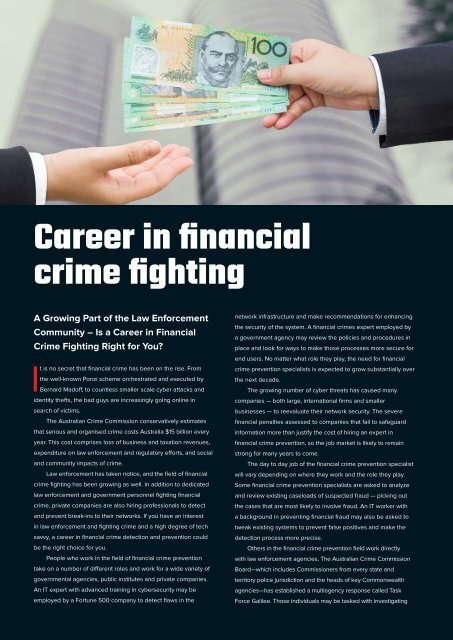Commando News Aug16
Create successful ePaper yourself
Turn your PDF publications into a flip-book with our unique Google optimized e-Paper software.
A Growing Part of the Law Enforcement<br />
Community – Is a Career in Financial<br />
Crime Fighting Right for You?<br />
It is no secret that financial crime has been on the rise. From<br />
the well-known Ponzi scheme orchestrated and executed by<br />
Bernard Madoff, to countless smaller scale cyber attacks and<br />
identity thefts, the bad guys are increasingly going online in<br />
search of victims.<br />
The Australian Crime Commission conservatively estimates<br />
that serious and organised crime costs Australia $15 billion every<br />
year. This cost comprises loss of business and taxation revenues,<br />
expenditure on law enforcement and regulatory efforts, and social<br />
and community impacts of crime.<br />
Law enforcement has taken notice, and the field of financial<br />
crime fighting has been growing as well. In addition to dedicated<br />
law enforcement and government personnel fighting financial<br />
crime, private companies are also hiring professionals to detect<br />
and prevent break-ins to their networks. If you have an interest<br />
in law enforcement and fighting crime and a high degree of tech<br />
savvy, a career in financial crime detection and prevention could<br />
be the right choice for you.<br />
People who work in the field of financial crime prevention<br />
take on a number of different roles and work for a wide variety of<br />
governmental agencies, public institutes and private companies.<br />
An IT expert with advanced training in cybersecurity may be<br />
employed by a Fortune 500 company to detect flaws in the<br />
network infrastructure and make recommendations for enhancing<br />
the security of the system. A financial crimes expert employed by<br />
a government agency may review the policies and procedures in<br />
place and look for ways to make those processes more secure for<br />
end users. No matter what role they play, the need for financial<br />
crime prevention specialists is expected to grow substantially over<br />
the next decade.<br />
The growing number of cyber threats has caused many<br />
companies — both large, international firms and smaller<br />
businesses — to reevaluate their network security. The severe<br />
financial penalties assessed to companies that fail to safeguard<br />
information more than justify the cost of hiring an expert in<br />
financial crime prevention, so the job market is likely to remain<br />
strong for many years to come.<br />
The day to day job of the financial crime prevention specialist<br />
will vary depending on where they work and the role they play.<br />
Some financial crime prevention specialists are asked to analyze<br />
and review existing caseloads of suspected fraud — picking out<br />
the cases that are most likely to involve fraud. An IT worker with<br />
a background in preventing financial fraud may also be asked to<br />
tweak existing systems to prevent false positives and make the<br />
detection process more precise.<br />
Others in the financial crime prevention field work directly<br />
with law enforcement agencies, The Australian Crime Commission<br />
Board—which includes Commissioners from every state and<br />
territory police jurisdiction and the heads of key Commonwealth<br />
agencies—has established a multiagency response called Task<br />
Force Galilee. Those individuals may be tasked with investigating

















